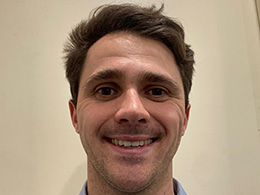By using our website, you consent to your data being collected and used as outlined in our Privacy Policy.

I started working as a physiotherapist at the end of 2019. I graduated from La Trobe University in 2018 and spent some time overseas. I worked in a private practice for a few months, but during Covid, I realised it wasn’t for me and decided to look for something different. That’s when I found an ad for Remedy Healthcare.
I knew Remedy was different from the start. The interview didn’t feel like an interview – we talked so openly the whole time about the role, my goals and my manager’s goals. By the end, I felt really good about where it could go.
When I started, I was set up with a mentor. We caught up every two weeks, which provided a good point of contact to help develop where my skills gaps were. I’d do a self-evaluation of clinical skills and interpersonal skills for us to look at. Then I’d also have a weekly catch-up with my manager Bec for operational things, like paperwork, processes, and forms.
I love my routine. Every day looks quite similar for me from a scheduling point of view. I start in my home office, where I spend 30 minutes doing admin stuff, such as paperwork and getting ready for patients by writing up an exercise program. Once my day is organised, that’s the hard part done. I drive to my first patient – I see between five and seven in a day – then I come home and finish with another 30 minutes of admin.
I have two categories of clients. They are either in Rehab@Home, or not. My Rehab@Home clients are seen through private health insurance as a substitute to in-patient rehab. That’s up to half of my caseload depending on how busy I am. It really varied during Covid because of the hold placed on surgeries. The other half of my patients are referred through homecare packages, but that might be different for other community physios.
The mix really works for me. The best thing about it is that the Rehab@Home program is about seven weeks, so some of my caseload is always transitioning and evolving, which means I can learn new skills and evolve too. Homecare clients are more constant, but I get to build a good relationship with them and become like a part of their family coming into their home every week. But if I had a full caseload of that, it would be very repetitive seeing the same people every week and not having the opportunity to learn new skills and grow.
Managing my day has never been a worry. Before I worked here, I had a maths tutoring business, so even though the context is different, the logistics of going to people’s homes, planning a session and completing it are almost identical. I like having control and responsibility over my calendar. You don’t get that in private practice – an admin assistant books in your clients and you might end up with four hours of back-to-back sessions followed by four hours of nothing!
It’s behavioural change in a patient that reinforces to me that I’ve done a really good job. I have a client I started seeing in the first week and still see her now; she has quite severe osteoporosis. I set her up with a strengths training program and saw here regularly for a month, and then every month. After a while she showed me an exercise book filled with all the exercises she’d been doing. She’d put so much time into it, and I was so proud that she was disciplined and took my advice on board. The best thing is we’ve slowed down her osteoporosis. She’s not fall free, but the two falls she’s had have resulted in no injuries, fractures or broken bones, which is brilliant.
